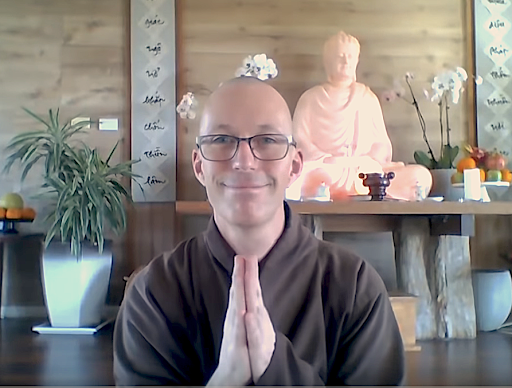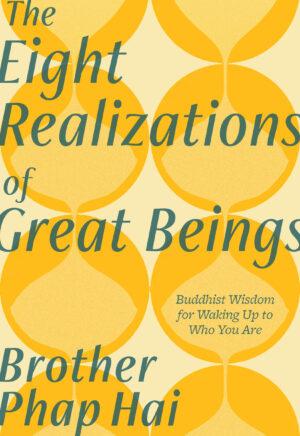
In celebration of this release, Brother Phap Hai sat down and answered some questions about the core messages in The Eight Realizations of Great Beings, which insight gives him the most pause, and what he hopes readers come away with.
Brother Phap Hai (Dharma Ocean) is a senior monastic disciple of Zen Master Thich Nhat Hanh. He was ordained as a monk in 1997 and was formally authorized to teach in January 2003. Originally from Australia, he is an active meditation teacher who leads retreats, days of mindfulness, and talks throughout North America, Australia, South America and Asia. Much loved for his warm, accessible, and humorous teaching style, Brother Phap Hai’s charming blend of Dharma scholarship, sharp social awareness, and application of ancient wisdom to contemporary issues makes him one of the most compelling Buddhist teachers today.
What led to your decision to explore the Sutra on the Eight Realizations of Great Beings in a new way?
Brother Phap Hai: Many years ago when I first encountered this text, I didn’t like it at all and was mystified as to why this short and seemingly simple text was one of the sutras that my teacher Thich Nhat Hanh or “Thay” asked us to treasure and why it had also been praised by many great teachers throughout history. As I began practicing with the insights in this text, however, I discovered that this sutra contains the very essence of the Buddha’s insight. If all other Buddhist sutras and commentaries were suddenly lost, with only this one Sutra remaining as a guide, it would still be possible for each one of us to fully comprehend the core insights of the Buddha on an experiential level. This is because it is a complete expression of the path as well as a practical manual for meditation.
Differing from other recorded sutras, the Sutra on the Eight Realizations of Great Beings is not a teaching that was delivered only to an audience 2,600 years ago, but is directed to all students of the Buddha throughout all time. In this way it is a heart teaching offered directly to each one of us—a teaching from the heart of the Buddha directly to you.
Additionally, the Sutra on the Eight Realizations of Great Beings has a fascinating history and directs our attention to the tremendous contributions of practitioners and translators from the Middle East and Central Asia. It is my hope to spark an interest and appreciation for the tremendous work that has been done by practitioners along the Silk Road in transmitting the teachings of Buddhism today. So many of the profound texts that inform our practice today, such as the Diamond Sutra, the Heart Sutra, the Sutra of Forty-Two Chapters, and so on, were translated and transmitted by these great teachers from the Middle East and Central Asia.
So in a small way, this book is my way of beginning to repay this kindness, especially at this moment in time.
What are some of the core messages in The Eight Realizations of Great Beings?
Brother Phap Hai: Some of the core teachings contained in the sutra are the invitation to engage with our whole life as our practice of awakening: to practice wholeheartedly and at all times, not compartmentalizing our life and our being. To bring all parts of ourselves to the table, especially the messy parts—and not leave anything out. Each moment and aspect of our life is a moment to open our heart, to go a little deeper, to wake up to our real situation. Perhaps those moments or those aspects of our life that we have overlooked might be the most powerful, healing, wise, and transformative moments of all.
Rather than being a complicated path, the practice of mindfulness and meditation is actually quite simple: keep turning towards your experience— the pleasant, the painful, the neutral—and notice the times that you turn away, and become interested in why that is. Then you will begin your path of discovery and insight will arise.
We are reminded in this text that the practice of Buddhism is a practice of uncovering that which has been within us all along at the same time as noticing our mind’s tendency towards always thinking that we lack something. As we begin to have confidence in our own capacity, we also begin to see this nature in everyone else; through touching impermanence, we cherish this moment.
We have enough—we are enough—and that the beginning point of an authentic spiritual journey is to cultivate confidence in our capacity to generate insight, compassion, transformation, and healing for ourselves and for those around.
Brother Phap Hai
The book is a combination of history, sutra commentary, and deeply personal stories. Why did you choose to structure it in this way?
Brother Phap Hai: This book evolved from a series of live talks that I offered at Deer Park Monastery over the course of a couple of years. The first part of each talk was a commentary on the rich and deep sutra text, and the last section of each talk was a story from my life.
Practitioners are often very interested in the lives of monastics—sometimes even more so than in sutra texts! On the one hand, I felt that offering personal stories might be a skillful means to have our friends come to the talks, and on the other hand, I felt that weaving a few threads of personal narrative through the talks and the book would be an encouragement to friends to tap into the narratives and stories in their own lives as a way of understanding the Dharma and the wisdom that wants to well up from within themselves. This is one of the aims of the Sutra of the Eight Realizations of Great Beings.
While each one of the Eight Realizations is important, is there one that has a deeper impact on you or makes you pause and think a bit more?
Brother Phap Hai: As you will discover in engaging with this beautiful text, each of the insights contains and leads into the others. The Sutra on the Eight Realizations of Great Beings itself is not an analytical text, but an invitation to practice. So often, we can have a tendency to mistake information or knowledge for insight. It is possible to intellectually comprehend or think about teachings and insights and still suffer very deeply, if these insights haven’t welled up from within us. In fact, sutras, commentaries, books, and talks are not the Dharma. They are about the Dharma. The Dharma is to be touched by each one of us in our own lives. In this text, the Buddha shares with us eleven essential subjects for our meditation through eight realizations and invites us to use these lenses to contemplate our experience.
That being said, my “doorway into this Sutra” was the Third Realization’s line: “the human mind is always searching outside of itself and never feels fulfilled.” What a powerful invitation, and so counter to the usual message that we receive or that we tell ourselves that if only we could obtain this or that, then everything will be OK. This line in the sutra is a lion’s roar reminding us that Buddhism is not a path of taking on more views and opinions, but rather, somewhat counterintuitively, a practice of letting go, of putting aside. We have enough—we are enough—and that the beginning point of an authentic spiritual journey is to cultivate confidence in our capacity to generate insight, compassion, transformation, and healing for ourselves and for those around.
What do you hope readers learn from The Eight Realizations of Great Beings?
Brother Phap Hai: I hope that readers will be inspired to allow the practice of mindfulness not to be something that they do—a set of techniques to “get” something that they think they lack—but rather understand that the practice of mindfulness, or of Buddhism, or the Dharma on a deeper level is their way of moving through the world—a deep expression of who they are. When we put tea leaves in warm water, what was once separate changes the nature of the other. Water has, at some indefinable moment, become tea. No one puts tea leaves in a pot, adds hot water, and then asks you if you would like a cup of hot water! In the same way, if we are able to bring this quality of curious attention to each moment of our lives just as they are, slowly this energy of attentiveness, carefully cultivated, becomes a natural response.
It’s a profound accomplishment to inhabit our moment-by-moment experience, to let the Dharma—your Dharma—be the way that you move through the world and look at your mind, your heart, and your experience, gently transforming your being—and not a set of techniques or a collection of information acquired from someone else.
I also hope that this book will be an invitation to find and honor the unexpected and overlooked teacher in our lives. A teacher here is a person or a situation that challenges us, that calls us forth to grow in some way, so it is my hope to inspire that curiosity, interest, and joy that will help readers to see that their unique path is a path that keeps growing and developing throughout their lives.
I hope this interview has you explore The Eight Realizations of Great Beings, which is out now.
-

The Eight Realizations of Great Beings
Essential Buddhist Wisdom for Realizing Your Full Potential
View this bookA Buddhist monk’s pithy guide to the Buddha’s instructions for greatness, The Eight Realizations of Great Beings assures us that anyone, anywhere can walk the path of mindfulness, and embody…
Brother Phap Hai (Dharma Ocean) is a senior monastic disciple of Zen Master Thich Nhat Hanh. He was ordained as a monk in 1997 and was formally authorized to teach in January 2003. Originally from Australia, he is an active meditation teacher who leads retreats, days of mindfulness, and talks throughout North America, Australia, South America and Asia. Much loved for his warm, accessible, and humorous teaching style, Brother Phap Hai’s charming blend of Dharma scholarship, sharp social awareness, and application of ancient wisdom to contemporary issues makes him one of the most compelling Buddhist teachers today.